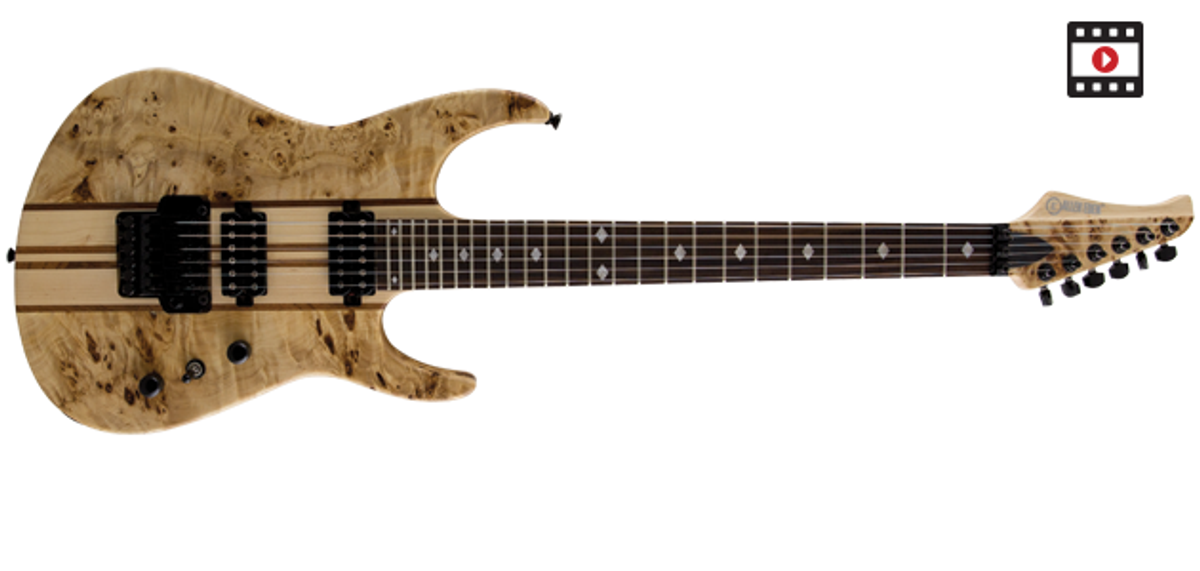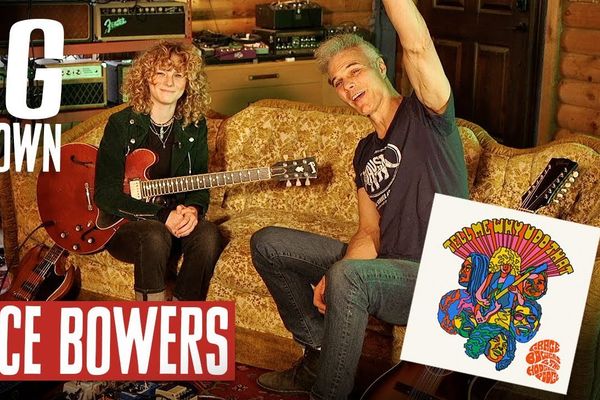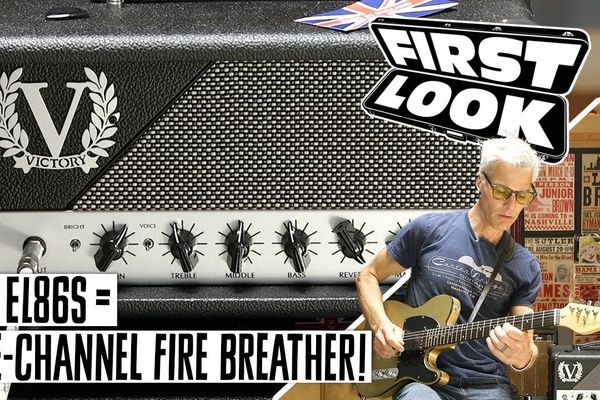This entry-level shred machine flirts with greatness at a rock-bottom price.
Allen Eden first hit the scene as a guitar parts manufacturer that sold bodies and necks to DIY enthusiasts. They’ve always been very focused on affordability, and on their website you’ll see necks that sell for as little as $60 and bodies for around $80. In 2014, they opened a retail store in El Monte, California, and expanded their line to include complete guitars. The 1987 is one of their more striking new offerings: a neck-through-body “super strat” that features a Floyd Rose-licensed tremolo and streets at $439. The guitar often dazzles for its combination of features, quality feel, and price.
The 1987 is a fairly bold visual statement, but it’s a very practical, functional, and smart design. The neck-through-body construction means the body center is an extension of the walnut-and-maple neck. The burl maple body wings are peppered with wood grain craters and valleys that are neither buffed out, nor filled, nor sanded down. You can even fit your fingertips into some of the pits on the body. Clearly, using wood that other builders might pass over for cosmetic reasons means saving costs without any sonic penalty. But a surprising secondary result is a distinctive guitar with major mojo. The walnut stripes, reverse headstock, and diamond inlays also lend hot-rod flair and pay homage to Ibanez, Alembic, and BC Rich’s ’70s instruments as well as metal’s glory days on the Sunset Strip. The guitar even arrived with a fancy looking, tweed hardshell case that's a $90 option. Otherwise it comes with a gig bag free of charge.
I tested the 1987 with a Mesa/Boogie Mark IV amp and some pedals including a Pro Co Rat and MI Audio Tube Zone Overdrive. With the amp clean, the neck pickups sounds like the richer of the two Wilkinson humbuckers offered, tone-wise. The bridge pickup sounds a bit thinner and congested. In isolation, both pickups exhibited a lack of sparkle and pop that doesn’t quite match the guitar’s outward personality. Their relative neutrality isn’t all-bad, though. In a band mix they were often a blank slate that made them a better fit than pickups with a more dominant personality might be.
The 1987 was clearly born to rock, so I wasn’t shy about using it with the many sources of dirt, distortion, and overdrive I have at my disposal. With the Mark IV’s lead channel engaged, the neck pickup has a sweet singing quality that sounded especially nice on upper fret bends. With the guitar’s volume and tone controls maxed, the pickup sounded articulate with an ever-so-slightly soft edge to upper register notes. (This is when the neutrality of the pickups works out well.) Further down the fretboard, things get a little woofy on the E and A strings. But while that type of tone might be too ratty for a shredder playing three-notes-per-string scales in low registers, it was amazing for fuzzed-out, stoner-rock riffs. The bridge pickup sustains nicely and can be surprisingly smooth and warm for high-gain lead sounds. It's not the most dynamically responsive pickup around, but for shred-styles, it does the trick.
Ratings
Pros:
Killer price for a neck-through-body guitar. Superb playability.
Cons:
Could benefit from a pickup upgrade. Some tuning stability issues.
Tones:
Playability:
Build/Design:
Value:
Street:
$439
Allen Eden 1987
allenedenguitars.com
Shredders will also like the sculpted neck joint, which allows for unobstructed access to the 1987’s 24 jumbo frets. The 25.5", 5-ply maple-and-walnut neck and flattish fretboard work perfectly with the low-action factory setup. Even bends way up high on the high E and B strings never fretted out. And it was a kick to play against a D minor track, bend the 24th fret high E to F, and hear the note ring true. The playability was so good that I soloed often and readily above the 17th fret.
For distorted chord work, the bridge pickup has enough of the bite necessary for classic metal. More complex, prog-type chord voicings would benefit from better note separation, and some modern metal styles might call for a bit more aggressiveness. Of course, if you’re hell-bent on switching the pickups, the low cost of the instrument means you’ll have more money to treat yourself to replacements. And for an extra charge you can order the 1987 from Allen Eden with a pair of Seymour Duncans that might get you closer to the shred tone you need.
Typically, when a guitar offers this much bang for the buck, something’s gotta give. And, not surprisingly, a few minor quality control issues were apparent. The pickup selector switch felt a little tight, while the volume knob seemed pretty loose. I also noted a few protruding fret ends—which clearly did not effect the superb action. And the Floyd Rose-licensed locking tremolo, which is factory set for upwards pull of almost a major third plus deep dive bombing, sometimes failed to stay in tune as well as a locking tremolo should.
The VerdictFor an axe that straddles the line, price-wise, between a beginner and intermediate guitar, the 1987 is leagues above many of its competitors in terms of playability. As is, it’s a solid-sounding instrument that could deliver for many heavy rock and metal gigs. Swap out the pickups (or opt for the Duncan upgrade) and maybe some of the tuning hardware, and you’re on your way to a pro-quality guitar at a bargain basement price.
Watch the Review Demo:



